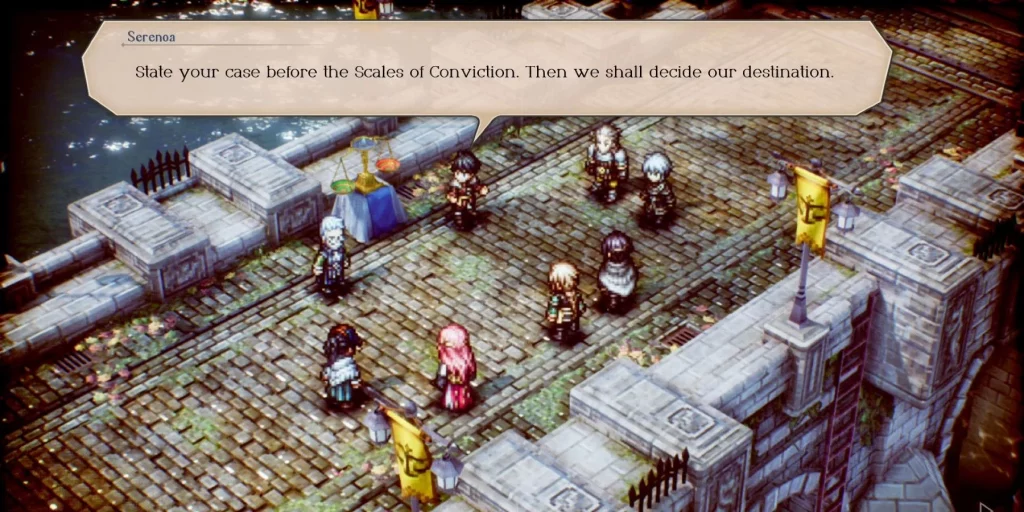Triangle Strategy employs a design technique I named “branching linearity” when I was pretending I was a game designer in the halcyon days of college. Instead of many choices with usually subtle or no effects on game flow, this design focuses on fewer but more dramatic choices that can significantly and (hopefully) irrevocably change the path the player takes.

It is true that Triangle Strategy also tries to weave subtler effects into its design, asking you to choose between the three virtues of thriftiness, relaxation, and stick-to-it-ivness, but the larger choices put you on distinct tracks; for example, early on in the game (and playable in the demo), you choose to visit country A or B. You cannot then go visit the other country – your choice is binary and it affects the plot and characters you may recruit. Branching linearity has an added benefit – mediocre stories become significantly more engaging.
Triangle Strategy seems inspired by A Song of Ice and Fire (that’s right, I have read a book) but fails to reach even Matsuno levels of quality. There is a lot of writing and a lot of it is drier than the desert, definitely-not-evil country I chose to visit. Undoubtedly, the complex inter political intrigue will be replaced by a battle with some ancient dragon/god/monster ala Shining Force, Fire Emblem, and every other JRPG ever made. But until then, I find myself really following all characters, plots, and angles as closely as possible. The game allows the player to pull up a speaking character’s biography at will and this ability certainly makes the game easier to follow. Ultimately, though, I am straining to follow who everyone is, where every location is, who likes whom, dislikes whom, and is related to whom because the choices all this nonsense leads to matter.
A final, unrelated point on Triangle Strategy – please stop making generic good guy lead characters. The lord you control and his fiance are painfully boring and guileless. If you are going to take inspiration from Martin, show the consequences of being a noble goody-two-shoes who thinks everyone else will play by the rules. Perhaps the game will surprise me by offering choices that allow darker options. I doubt it but would like to be pleasantly surprised.


“Undoubtedly, the complex inter political intrigue will be replaced by a battle with some ancient dragon/god/monster ala Shining Force, Fire Emblem, and every other JRPG ever made”
This is one of my chief complaints about FFT and Tactics Ogre (since you brought up Matsuno). Even if they stick with the intrigue longer and integrate the monster-y bits early, you end up with the monster.
I think the early Suikodens do this a little better (you still have a big fight… but it’s a last-ditch-effort thing on the part of your decidedly human opponent).
Thanks for the Triangle Strategy impressions. I’ll be interested to hear if it’s more like Infinite Space (decisions affect a chapter, and they wind back together) or Front Mission 3 (an innocuous decision at the start of the game means a totally different, game-length campaign).